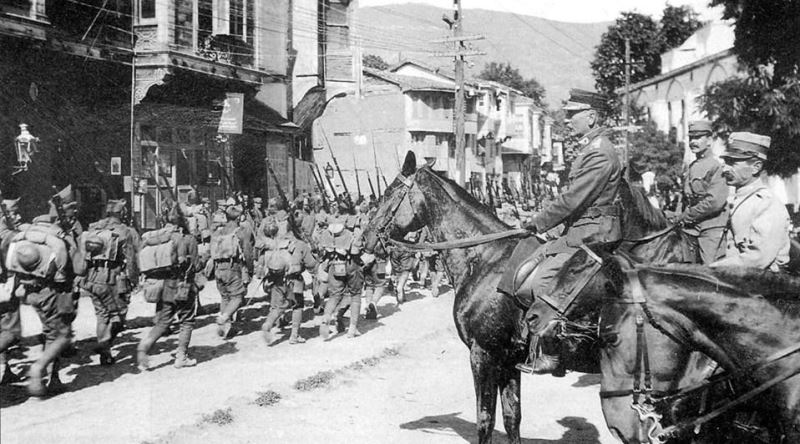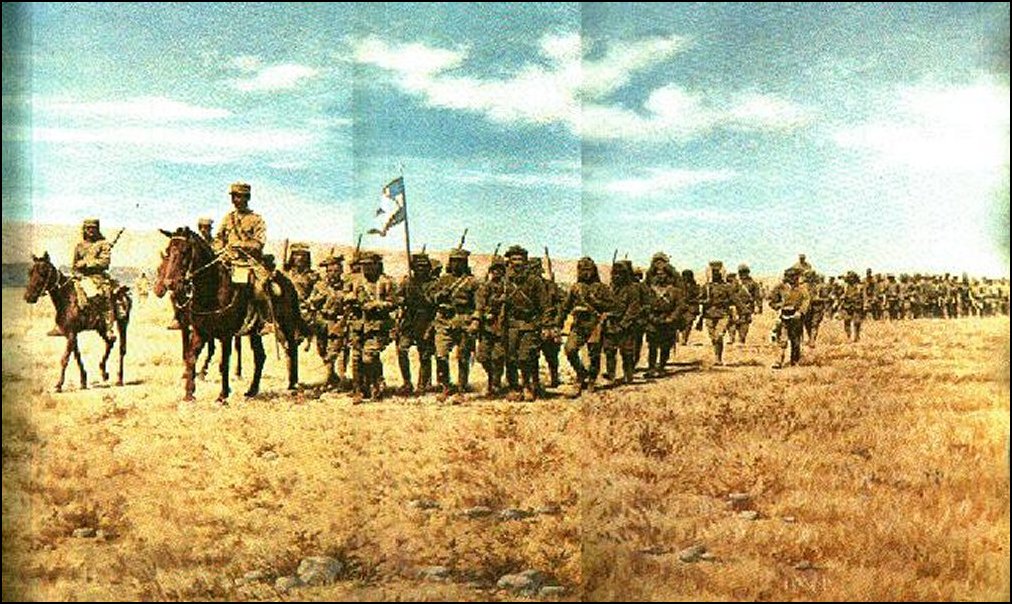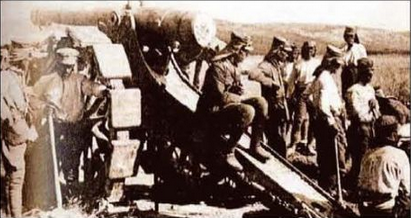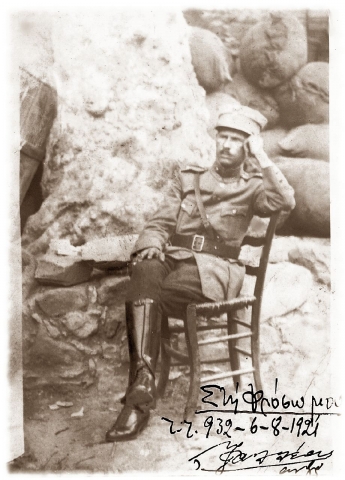
THE ASIA MINOR CATASTROPHE OF GREEKS
1918 was a year of consecutive disasters for the Ottomans. As a result of a senseless entry into World War I, the armies suffered defeat, and the responsible leaders fled the country. Meanwhile, the elderly Sultan Mehmed V Reşad, who had not intervened in any matters, passed away, and his brother Sultan Mehmed VI Vahideddin succeeded him. The new sultan realized that he ascended the throne in a place that had been left in ruins. Meanwhile, the enemies passed through Çanakkale (Dardanelles) and occupied Istanbul. The Istanbul government was now obliged to pursue the most prudent policy under these circumstances.

A Non-Young Turk Pasha Sought After
Following the collapse of the Syrian Front, the Armistice of Mudros was signed with the Allies. Rauf Orbay, who later became one of the prominent figures in the Ankara movement, signed the armistice. For the implementation of the armistice, an army inspector needed to be sent to Anatolia. The British insisted that this should be a senior-ranking Pasha who was not a Germanophil. There were three people fitting this description: Palabıyık Ziya, Çerkes Ferid, and Mustafa Kemal Pasha. The first two declined the offer due to health and other reasons.
Retreating from Syria to Istanbul and being idle at that time, Mustafa Kemal Pasha was dispatched to Anatolia by the government of Damad Ferid Pasha with extraordinary powers as the Inspector of the 9th Army. These powers included the authority to dismiss governors, and he was entrusted with the meager budget from the government's treasury. Governors and district governors were also ordered to assist the Pasha in every way possible.
This seemed to be the situation, but the Pasha had yet another hidden motive. Simultaneously, resistance societies were being formed in Anatolia, while the Young Turks were also striving to regain power. Through Mustafa Kemal Pasha, the Sultan hoped to consolidate and neutralize this movement, thus holding a card against the enemy to negotiate peace under more favorable conditions. He never saw armed resistance against the enemy as permissible. However, the Pasha likely had other intentions in mind. He set out with a British visa, as Istanbul was under occupation. It was precisely during these days that the Greeks landed in Izmir (Smyrna).
Count Sforza, who had close masonic ties with the Union and Progress Party, told Kemal that the Greeks would invade Izmir, that resistance against this and a new government should be established in Anatolia, and that Italy would support this resistance (Falih Rıfkı Atay, Çankaya).

What Were They Doing in Izmir?
The British Foreign Secretary, Sir Edward Grey, had promised Izmir to Greece, or rather to Venizelos, in exchange for entering the war. This was the cradle of ancient Greek civilization. It was easy to persuade the Greek people to accept the occupation. Ostensibly, there was also the excuse of protecting the Orthodox Christians in Anatolia who had suffered injustice since the Young Turk era. The Greek king, who vehemently rejected the proposal, was dethroned and sent into exile. War supporter Venizelos was brought to power. Anti-war newspapers and individuals were silenced. Veteran soldier General Metaksas, who had warned as early as 1915 that the occupation of Anatolia would end in disaster, was dismissed from duty.
The Greek troops landed in Izmir on May 16, 1919. The Istanbul government established the "Redd-i İlhak Society" (Rejection of Annexation Society) there. As part of their long-standing Turkification policy, the Young Turks had unjustly deported about 120,000 Greeks living in the Aegean to Greece before the World War. The other Greeks living in Anatolia were also anxious. The Greek soldiers used this as an excuse to be landed in Izmir and Ayvalık by the Allies.
The occupation was the plan of Venizelos, who sought to capitalize on the rewards of the alliance in the war, along with his relentless admirer Lloyd George. But the conditions had changed significantly since 1915. The Allies not only did not consent to this occupation but also the British War and Foreign Ministries were against it. Without their assistance, it was impossible for the Greeks to invade and hold onto Anatolia. Moreover, the consecutive agreements and support from Italy, France, and Russia for movements in Anatolia spelled out the disastrous end of this adventure. Venizelos, who was stubborn and Lloyd George, who was a dreamer, failed to see this.
Even after the occupation, the idea of Western Anatolia being given to Greece was not even on the table. While there may have been some in Greece who thought so, the sensible segment did not share this view. Indeed, according to the Treaty of Sèvres, the occupation of Izmir which began on May 16, 1919, would last for five years, after which a referendum would be held. Since the majority of the population here was Greek, the implication was that Izmir would be given to Greece.
However, the advance of the Greek army to Ankara is another matter. It was a project concocted to obstruct the Ankara government. On November 3, 1919, the British drew a line for the Greek occupiers that they couldn't cross. This line, named after British General Milne, passed southward from Mount Aymazdağı above Ayvalık, through Tatarköy, Keşelli, Sard, Bademlik, Umurlu, and Selçuk. Provoked by the protests and raids of the Kuva-yı Milliye (National Forces) gangs in Anatolia, the Greeks launched an attack on January 18, 1920, and crossed this line on June 22, 1920.
Support and Assistance
Not only the Greeks but also other powers were occupying Anatolia. But it is striking that there is no resistance against them.
Mustafa Kemal Pasha united the societies. He convened an alternative government in Sivas in September 1919. By employing tremendous diplomacy, he maintained good relations with Istanbul while avoiding alarming the British. At the same time, he reached agreements with the French, Italians, and Russians. In exchange for some concessions, he obtained significant support. The French and Italians handed over important war supplies to Ankara. The Russians provided weapons and financial assistance. They also contributed to the movement portrayed as the rescue of the caliphate, especially from Turkestan and India, along with Muslims worldwide.
Otherwise, the people of Anatolia had no desire left for war. In the Battle of the Sakarya alone, the number of deserters exceeded fifty thousand. Therefore, those who took to the mountains for various reasons and engaged in banditry were pardoned on the condition that they aided the war effort. Every family was obligated to provide financial support to the army. Those who did not support the army were subjected to severe penalties. Some remnants of the Young Turks also crossed over to Ankara, pinning their hopes on this new movement.
The Caucasus military units remaining from the Ottoman army were redirected to the Aegean region, while supplies and military personnel were dispatched from Istanbul to Anatolia. These provisions and personnel were transported via motorboats through the Sea of Marmara or the Black Sea to Anatolia. In Istanbul, there were four secret organizations - the Karakol Society (Yavuz Group), Muavenat-ı Bahriye Group, Felah Group, and M. M. Group - the last two of which were directly connected to Ankara. Under the guidance and control of the Armenian-origin British intelligence chief Arman Pandikyan, these organizations transported ammunition and supplies from Istanbul to Anatolia. Militias left over from the Young Turks and amnesty-promised law offenders, along with the bandits known as "efeler," formed the initial Kuva-yı Milliye. Later, this irregular army would be organized into a regular force.
The money collected in aid campaigns conducted by the Palace under the pretext of aid to the Red Crescent was also transferred to Ankara. Although the Palace was opposed to the Kemalist forces, which it saw as a struggle for power, it supported this movement as it realized it couldn't do anything to stop it.

The Conflict Lasted 3.5 Years
The situation of the Greeks was also in favor of the Turks. Firstly, the Greeks were operating in unfamiliar territory, akin to an 'away game.' Moreover, their forces were insufficient to occupy Anatolia, and they lacked support. Many soldiers and officers were not enthusiastic about the war, leading to hundreds of thousands of desertions. As news of deaths from Anatolia arrived, anti-war sentiment among the Greeks increased. The British, following their usual 'Wait and see!' policy, avoided supporting the Greeks. They would align with whoever emerged victorious and conduct their affairs accordingly.
The situation of the armies on both sides was nearly identical. Nevertheless, despite this, the Greek army quickly advanced in a broad arc, reaching Ankara from Izmir via the northern line of Bursa and Bilecik and the southern line of Uşak and Afyon. Although the relocation of the Parliament to Kayseri was decided, according to rumors, the wives of the deputies, who had just begun settling in Ankara, reportedly prevented this.
The Turkish army won twice and lost twice. After 2.5 years of occupation, in August, near Polatlı, the Greek army suffered a heavy defeat and began to retreat. The Ankara forces, numbering 200,000, faced little resistance. Commander-in-chief Trikopis was captured near Uşak. The majority of the Greek soldiers were annihilated; those who managed to survive were either captured or fled towards Kütahya and Bursa.
The final blow was dealt near Afyon on August 30 of the following year. September 9, 1922, marks the date when the Greeks abandoned Izmir. Thus, the Greco-Turkish War lasted for a full 3.5 years, just half a year short of World War I. The losses on both sides were roughly equal. Although the war officially ended with the Armistice of Mudanya, British troops remained in the Marmara region for another 1.5 years. The liberation of Istanbul took place on October 13, 1923, a few months after the signing of the Treaty of Lausanne.
As a result of this conflict, which is considered the final battles of World War I, the British obtained more than they had anticipated. By portraying the Sultan as a traitor and removing him from the caliphate, they freed themselves from the caliphate. Seeking to turn a new page with the new Türkiye, Britain thus succeeded in creating a new enemy, thereby managing to erase the enemy image that had been cast upon itself.
Indeed, in a recent survey titled "Türkiye's top 10 enemies", Greece ranks first, with England not even making the list. Realizing its mistake in the adventure it embarked upon, known as the Asia Minor Catastrophe, Greece attempted to rectify the situation. Venizelos, in the role of an old enemy turned new friend, visited Ankara. In fact, the Municipality of Thessaloniki purchased an old Turkish house as a sign of friendship and gifted it to the Turkish government as "the house where Mustafa Kemal Pasha was born." However, rectifying historical mistakes can be quite challenging. Strangely, many seem to lack a desire for good relations with the neighbors.
Önceki Yazılar
-
FRIENDS OF ENGLAND ASSOCIATON24.04.2024
-
HOW DID WOMEN VEIL, AND THEN HOW WERE THEY UNVEILED…10.04.2024
-
HOW CAN HISTORY BE BELIEVED?3.04.2024
-
THE OFFICIAL MADHHAB OF THE OTTOMAN EMPIRE27.03.2024
-
WHO ORDERED THE PLUNDER OF ISTANBUL?20.03.2024
-
THE PLAYS BANNED BY SULTAN ABDULHAMID IN EUROPE13.03.2024
-
WHAT WAS THE MISTAKE OF THE UMAYYADS?6.03.2024
-
UNRAVELING THE UMAYYAD PERIOD: TRIUMPHS, TRAGEDIES, AND TRUTHS28.02.2024
-
OTTOMAN PENAL CODE AND HOMOSEXUALITY21.02.2024
-
WHAT IS LAICISM? WHAT IS IT NOT?14.02.2024